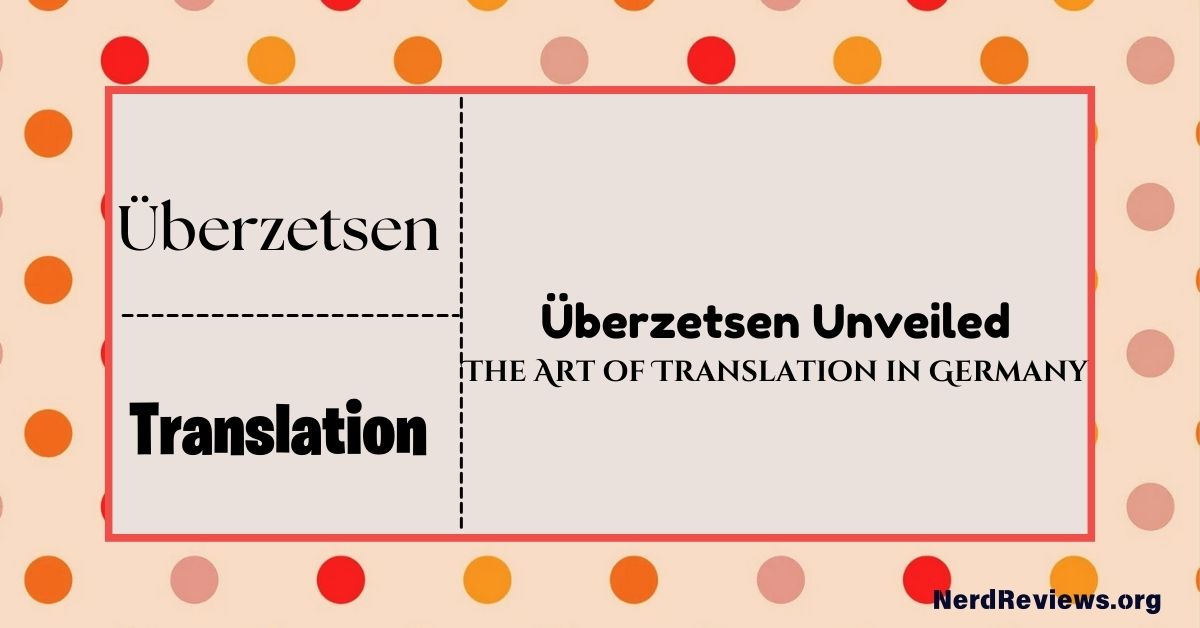Germany is a cultural, innovative, and linguistic hub in the middle of Europe. The intricate and historically significant German language is a major player on the international stage. The dynamic and lively field of translation in Germany is encapsulated by the phrase “überzetsen,” which means “translation” in English. This blog dives into the fascinating realm of überzetsen, investigating its relevance, methods, and effects.
The Significance of Überzetsen
- Why Translation Matters in Germany
As a nation with a diversified population and a robust economy, translation plays an essential role in German communication. Good translation services are always in demand because of the proliferation of global trade, education, and cultural interaction. - Historical Context of Translation in Germany
Beginning in the Middle Ages, Germany has a rich and illustrious history of translation. The dissemination of knowledge and culture across Europe and beyond has been greatly aided by the translation of literary works, scientific publications, and religious materials.
The Process of Überzetsen
- Understanding the Basics
One of the main goals of translation is to transfer the intended meaning and context of a piece of writing from one language to another. Mastery of the target language as well as the source language is essential for this procedure. - The Role of Technology in Translation
German modern translation is highly dependent on technological means. The advent of AI, machine learning, and translation software has sped up and improved the quality of translations, completely changing the market. - Translation by Humans vs. Machines
Human translators are still essential, even if technology has come a long way. Their proficiency in cultural idioms, subtleties, and context guarantees an accurate and culturally relevant translation.
The Different Fields of Translation
- Literary Translation
The great literary tradition of Germany can be better shared across the world through translations of German literature. To be successful, literary translations must stay true to the author’s intended meaning, style, and tone. - Technical Translation
German industry and technology are strong, thus accurate technical translations are essential. Translations including technical specifications, patents, and user manuals necessitate the highest degree of precision. - Medical Translation
Especially for healthcare providers and pharmaceutical businesses, medical translation is crucial in Germany. Compliance with rules and patient safety are guaranteed by accurate translations of medical documents, research papers, and other personal information. - Legal Translation
Legal translation encompasses the process of translating statutes, contracts, and other legal documents. Translators working in this area must be fluent in both languages and possess an extensive knowledge of legal principles and terminology.
The Challenges of Überzetsen
- Maintaining Accuracy and Consistency
When translating into fields like technology or law, where even a small mistake can have far-reaching effects, accuracy and consistency become paramount concerns. - Cultural Differences
In order for translated content to connect with its intended audience, translators must manage cultural variances. To do this, one must be sensitive to cultural subtleties in order to forestall misunderstandings. - Evolving Language Trends
Translators need to be aware of current idioms, slang, and linguistic trends to guarantee their translations are accurate and up-to-date as languages change.
The Impact of Überzetsen on Various Sectors
- Business and Commerce
Companies may expand their operations to new countries, interact more effectively with international partners and customers, and operate on a worldwide scale thanks to translation. - Education and Academia
Academic translation is a boon to the sharing of information and findings. Through it, academics and students from all around the globe are able to work together and have access to more resources. - Tourism and Hospitality
Translation services are a boon to Germany’s tourist sector. Making sure that guides, menus, and signage are translated makes guarantee that international guests have a friendly experience.
How to Become a Translator in Germany
- Educational Requirements
A degree in translation studies or a comparable discipline is usually required for those who aspire to be translators. You can get the requisite education and training in a variety of specialized programs offered by German institutions. - Certifications and Professional Associations
Translators can boost their credibility and job opportunities by getting certified from reputable organizations like the BDÜ (Federal Association of Interpreters and Translators). - Building Experience
A translator’s portfolio and skill set can be enhanced through internships, freelancing, or employment with translation companies, all of which provide practical experience.
The Future of Überzetsen
- Technological Advancements
As AI and ML continue to improve, the future of translation in Germany is bright, with even more efficient and accurate translations on the horizon. - Increasing Demand
There will be more chances for translators in Germany as the need for translation services rises due to globalization.
Conclusion
The realm of German überzetsen is just as varied and ever-changing as the nation itself. The work of translators is vital in facilitating cross-cultural understanding and communication, whether it be for literary works, technical documentation, medical records, or legal documents. Überzetsen is and will be an interesting and important career for the foreseeable future, thanks to rising demand for translation services and ever-improving technology.
For More Reviews, Click Here!
FAQs
What does the term “überzetsen” mean?
“Überzetsen” is the German word for “translation.”
How has technology impacted the translation industry?
Technology has significantly improved the speed and accuracy of translations through advanced software, machine learning, and artificial intelligence.
Why is human translation still important despite technological advancements?
Human translators are essential for capturing cultural nuances, idiomatic expressions, and the overall context of the source text, which machines often struggle to replicate.
What are the main fields of translation in Germany?
The main fields include literary, technical, medical, and legal translation.
How can one become a translator/ Überzetsen?
Aspiring translators typically need a degree in translation studies, relevant certifications, and practical experience through internships or freelance work.

